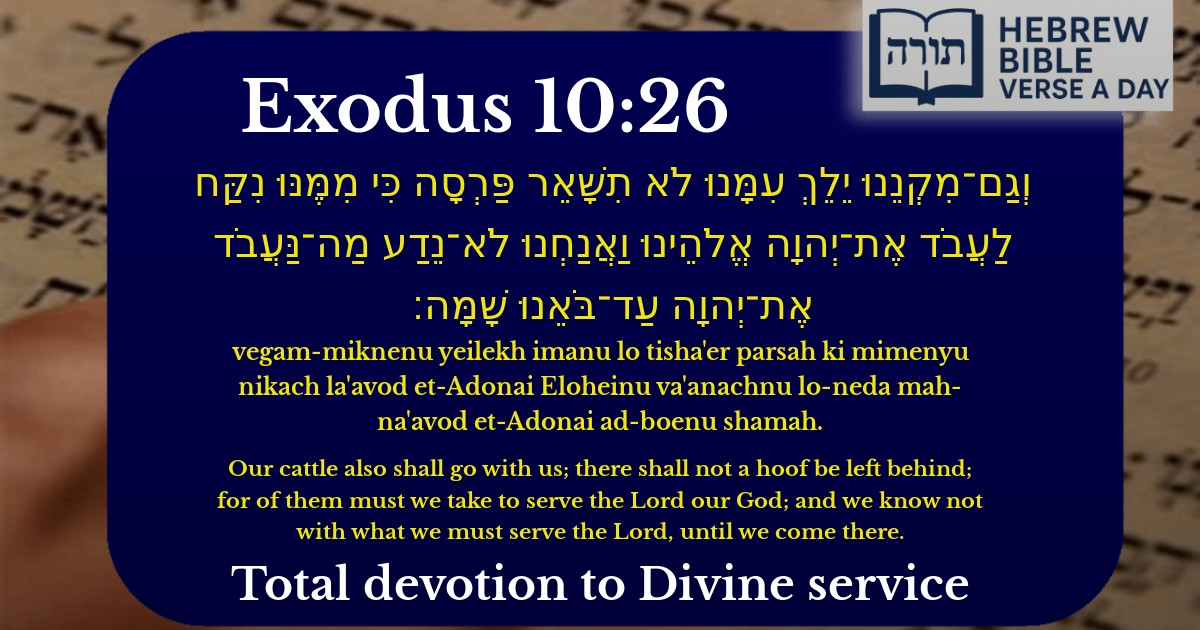Join Our Newsletter To Be Informed When New Videos Are Posted
Join the thousands of fellow Studends who rely on our videos to learn how to read the bible in Hebrew for free!
Hebrew Text
וְגַם־מִקְנֵנוּ יֵלֵךְ עִמָּנוּ לֹא תִשָּׁאֵר פַּרְסָה כִּי מִמֶּנּוּ נִקַּח לַעֲבֹד אֶת־יְהוָה אֱלֹהֵינוּ וַאֲנַחְנוּ לֹא־נֵדַע מַה־נַּעֲבֹד אֶת־יְהוָה עַד־בֹּאֵנוּ שָׁמָּה׃
English Translation
Our cattle also shall go with us; there shall not a hoof be left behind; for of them must we take to serve the Lord our God; and we know not with what we must serve the Lord, until we come there.
Transliteration
Vegam-miknenu yeilekh imanu lo tisha'er parsah ki mimenyu nikach la'avod et-Adonai Eloheinu va'anachnu lo-neda mah-na'avod et-Adonai ad-boenu shamah.
Hebrew Leining Text
וְגַם־מִקְנֵ֜נוּ יֵלֵ֣ךְ עִמָּ֗נוּ לֹ֤א תִשָּׁאֵר֙ פַּרְסָ֔ה כִּ֚י מִמֶּ֣נּוּ נִקַּ֔ח לַעֲבֹ֖ד אֶת־יְהֹוָ֣ה אֱלֹהֵ֑ינוּ וַאֲנַ֣חְנוּ לֹֽא־נֵדַ֗ע מַֽה־נַּעֲבֹד֙ אֶת־יְהֹוָ֔ה עַד־בֹּאֵ֖נוּ שָֽׁמָּה׃
וְגַם־מִקְנֵ֜נוּ יֵלֵ֣ךְ עִמָּ֗נוּ לֹ֤א תִשָּׁאֵר֙ פַּרְסָ֔ה כִּ֚י מִמֶּ֣נּוּ נִקַּ֔ח לַעֲבֹ֖ד אֶת־יְהֹוָ֣ה אֱלֹהֵ֑ינוּ וַאֲנַ֣חְנוּ לֹֽא־נֵדַ֗ע מַֽה־נַּעֲבֹד֙ אֶת־יְהֹוָ֔ה עַד־בֹּאֵ֖נוּ שָֽׁמָּה׃
🎵 Listen to leining
Parasha Commentary
📚 Talmud Citations
This verse is not quoted in the Talmud.


Context in the Exodus Narrative
This verse (Exodus 10:26) is part of Moshe's response to Pharaoh's demand that the Israelites leave their livestock behind when departing Egypt. Moshe insists that all livestock must accompany Bnei Yisrael, emphasizing their need for these animals to serve Hashem. The exchange occurs during the negotiations preceding the final plague (Makkat Bechorot).
Rashi's Explanation
Rashi comments on the phrase "לֹא תִשָּׁאֵר פַּרְסָה" ("there shall not a hoof be left behind") that Moshe was conveying absolute refusal to compromise—even a single animal's hoof would not remain in Egypt. Rashi further explains that the livestock were needed for sacrifices, particularly the Korban Pesach, which Bnei Yisrael would soon offer (citing Mechilta).
Rambam's Perspective on Divine Service
Rambam (Hilchot Ma'aseh HaKorbanot 8:8) discusses how the verse underscores the principle that serving Hashem requires proper preparation and resources. The phrase "וַאֲנַחְנוּ לֹא־נֵדַע מַה־נַּעֲבֹד" ("we know not with what we must serve") teaches that one cannot predict all future mitzvah obligations, so it is essential to be fully equipped for avodat Hashem.
Midrashic Insights
Halachic Implications
The Chatam Sofer (Torat Moshe) derives from this verse that when fulfilling mitzvot, one must ensure all necessary materials are available without relying on others. The refusal to leave even a single hoof teaches the importance of complete ownership and readiness in divine service.